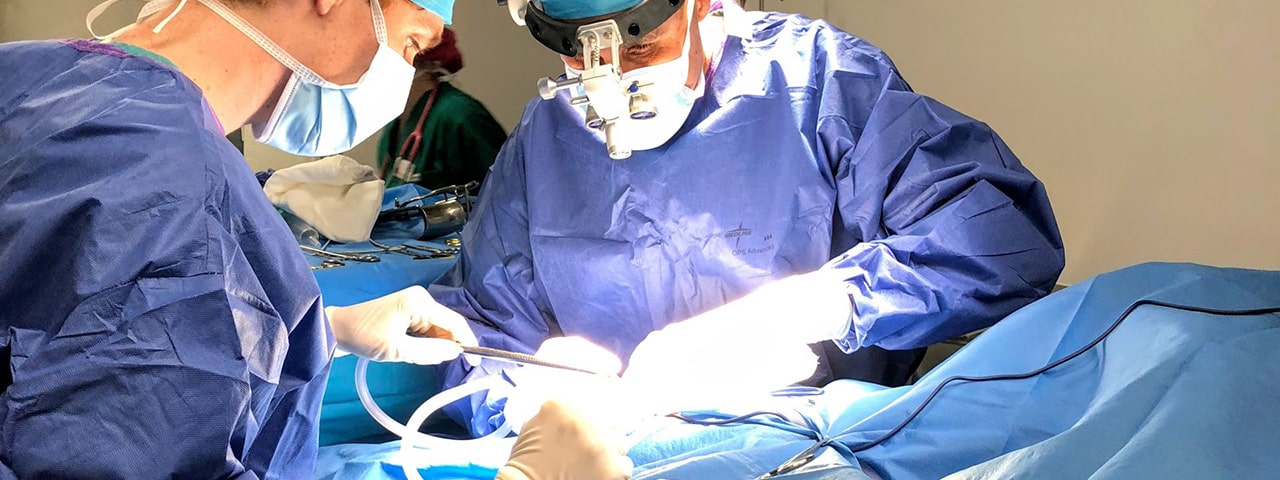We feature a range of vet surgical courses depending on the areas a vet surgeon wants to specialize in.
Charles’ Big Day Out – at the Emergency Room
“A man from Australia has called you eight times.” is not what my wife wanted to hear from the receptionist at the hotel desk in Chile when she returned from the closing ceremony dinner at The World Equine Veterinary Association symposium in Santiago. She immediately called me on my mobile. I said “I am about to go into surgery.” Her reply was “So? You had to call me eight times for that?”
“No,” I said “I am about to go into surgery on ME!” I was woodworking and stuck a very sharp chisel through my hand. I am about to have microsurgical exploration of my left hand. I have cut at least a couple of tendons.” After a pause, her overly sentimental response was “We are going to get SO much money for all your power tools on EBay.”
So, 7 years ago, I was lying in emergency at Cabrini, giving serious consideration to the idea that my career might be over. I had been there for 5 hours, when a nurse asked if I had yet received any pain relief. “No.” I replied. She generously handed me two Panadol. I had already been examined by the attending physician, had radiographs and was waiting for the plastic surgeon. The only time it really bled was after the radiographer squashed my hand against the x-ray plate. Apparently perfect positioning was more important than blood loss and pain. I had to sign a consent form where I had to write, in my own words, what was going to be done in my surgery. It was difficult, because it had not been explained to me.
I woke up 4 hours later with my hand in a big splint. My surgeon came in to visit me. He reported that I had cut three tendons (superficial and deep flexor to my index finger, deep flexor to my middle finger), two nerves (to the lateral skin on my thumb and the medial skin on my index finger), an artery and two muscles. He managed to put everything back together, perfectly. In typical form, my surgeon was quite cavalier. “You will be back to 100% within about 2 months.”
The care that I received was extremely competent and professional. The only concern I had was when the nurse came in at 10:00 am the next morning and said “you can go home whenever you want.” No discharge instructions, wheel chair escort to the front door, pat on the back, nothing. “Just get your things and go.”
I convalesced from Sunday morning when I got home until Monday morning, when I scrubbed in on 4 surgeries. Against Dr.‘s orders, of course. Luckily, I had the help of my wonderful co-surgeons – Cassie and James. I started physiotherapy the next day (Tuesday) and was on the road to recovery.
I was sacked by my hand therapist at 6 weeks because I was doing too well. I was a “highly motivated” patient and would benefit from no more physiotherapy. I had been doing twice as many exercises as had been prescribed and made very rapid progress. In all, my left hand took 3 weeks off from surgery. My right hand took… let’s see… none. I was touch typing with both hands within 6 days. I did take a 3 month hiatus from tennis. I have managed not to sell my power tools, but have not started any new woodworking projects.
So, here I am, 7 years out. My hand is perfect. The cutaneous sensation in my hand has returned and I am extremely grateful for the wonderful care provided to me by my surgeon and my hand therapist.
My experience reinforced some of the things we already do Southpaws:
1. Administer pain relief early. Although my hand really did not hurt that much, it would have been nice to have had the option.
2. Clearly explain what is going to be done and what the potential risks are.
3. Use local anaesthetics in every case. The block the pain sensation from the time of surgery onwards. My recovery was nearly pain-free. I took a total of 8 codeines in the week following surgery.
4. Give adequate discharge instructions.
5. Physiotherapy is amazing. In a very limited data set, I can attest to the fact that vigilant physiotherapy accelerates recovery, and it gives a feeling of control in a situation where you have little.

